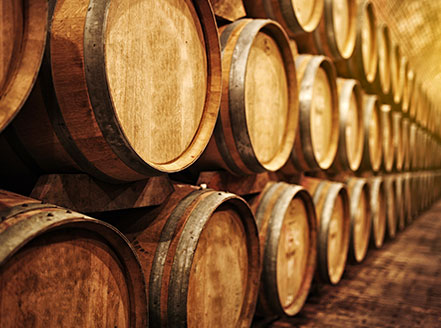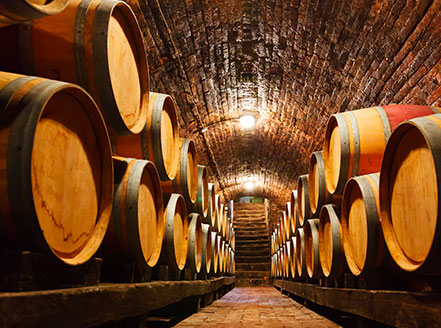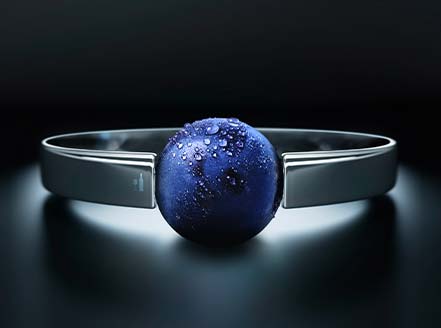
Chateau Beychevelle Wines
The identity of Beychevelle is based on a legend. At the beginning of the 17th century, the Château became the property of the First Duke of Épernon. He was so powerful that ships sailing the Gironde...Read More

In stock. Available for pick-up at store

In stock. Available for pick-up at store

Pre-arrivals – 2 to 4 months delivery
with the promo code : FEB26

Pre-arrivals – 2 to 4 months delivery

Pre-arrivals – 2 to 4 months delivery

Pre-arrivals – 2 to 4 months delivery

Pre-arrivals – 2 to 4 months delivery

Pre-arrivals – 2 to 4 months delivery

Wine Futures – delivery in early 2027

Pre-arrivals – 2 to 4 months delivery
ALL OUR FUTURES WINES
WHY BUY WINES FUTURES ?
FUTURES WINES 2024
Chateau Beychevelle | A Luminous North Star of the Medoc
Gazing out over the banks of the Garonne River in the southeastern tip of Saint-Julien, Chateau Beychevelle glitters brightly, a precious jewel in the crown of the Medoc wine region. At first glance, this magnificent Classified Growth stands out for the stunning classic architecture of its chateau, surrounded by perfectly manicured gardens and grounds.
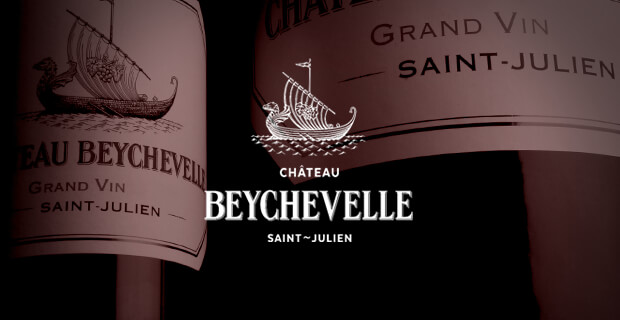
Its illustrious history and one-of-a-kind aesthetic are steeped in the theme of tall ships and adventures at sea, the inspiration behind the design for the chateau’s state-of-the-art new winery and the boat with the griffon-shaped prow that graces the label of each bottle of Chateau Beychevelle wine. From 220 acres of carefully guarded vineyards comes a wine with such elegance and poise, a rich and smooth texture on the palate and a quite, supple, understated power.
The Illustrious Past of Chateau Beychevelle
Throughout the centuries of its history, Château Beychevelle in Bordeaux’s Saint Julien appellation has been ruled by a noble line of influential men and women, who have brought glory and their own signature touches to the estate. The construction of the iconic chateau was commissioned by Bishop Francois of Foix-Candale in 1565.
At the beginning of the 17th century, the estate became the property of the first Duke of Epernon Jean-Louis Nogaret de la Valette, a great French navy admiral, mignon of King Henri III and Governor of Guyenne. During his reign, all boats passing the estate on the Garonne would have to lower their sails as a sign of respect for and allegiance to the duke – hence the Gascon name “Bêcha vela” or “baisse voile” in French, meaning “lower sail,” which became “Beychevelle” over time. The emblem of the chateau also echoes this noble past through a ship with a griffon-shaped prow, which is featured on every bottle of Chateau Beychevelle wine.
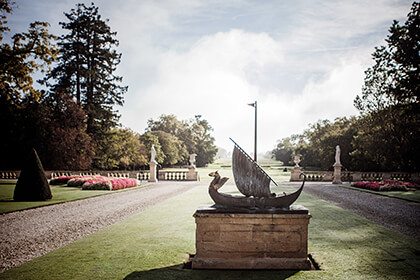
The second Duke of Epernon also contributed to the rich history of Chateau Beychevelle by inviting a troupe of actors to perform and stay at the chateau, including the young artist Jean-Baptiste Poquelin (better known as Moliere). In 1757, the estate was acquired by the Marquis de Brassier, who renovated and rebuilt the estate, constructing the Beychevelle port. During the reign of Bordeaux wine merchant and Saint Julien mayor Pierre-Francois Guestier, Chateau Beychevelle was classified as a Fourth Growth in the 1855 Classification of the Medoc wines commissioned by Napoleon III.
In 1875, the estate was purchased by Armand Heine, who extended the chateau by constructing its north wing. The Heine family was responsible for replanting the vineyard following the phylloxera epidemic, which devastated the wine regions of France at the end of the 19th century.
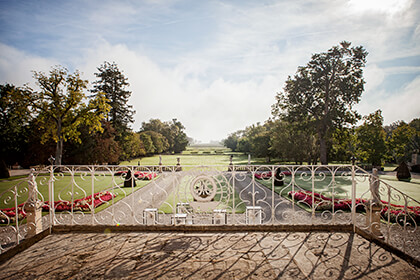
Together, Monsieur and Madame Heine beautified the chateau, decorating its gates and adding immaculately landscaped sculpture gardens and a conservatory of tropical plants and exotic birds, all connected through a series of picturesque walkways. It was during this time that the chateau earned its reputation as the “Versailles of the Medoc,” a reputation it still proudly holds today. The chateau remains deeply involved in the arts, welcoming artists from around the world to hold exhibitions and concerts in the estate’s magnificent setting.
The chateau stayed the property of the Heine family for several generations before being acquired by Aymar Achille-Fould in 1970. Today, Chateau Beychevelle belongs to Grands Millesimes de France, part of the groups Castel and Suntory.
Rooted in Garonne Gravel | The Vineyards of Chateau Beychevelle
Chateau Beychevelle is a Fourth Classified Growth of 1855 situated in the Saint-Julien appellation of the Medoc region, on the Left Bank of the Bordeaux region of France. Today, the Chateau Beychevelle estate spans 250 hectares (620 acres), of which around 90 hectares (220 acres) are dedicated to vines. The rest of the property is covered with pine forests and grasslands used to graze Limousin cattle. The Garonne River, in close proximity to the vineyard, creates a unique microclimate by moderating the temperature, protecting the vines from the harsh winter temperature and searing summer heat.
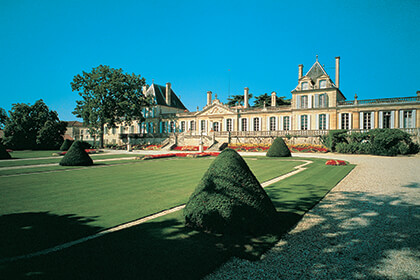
The vines of Chateau Beychevelle are aged 30 years on average and planted on two plateaus, stretching their substantial root systems deep into Garonne gravel soils from the Gunzian era upon a clay-gravel subsoil. These emblematic Medocain gravel soils are famous for their excellent water drainage and for capturing the warmth of the sun during the day in order to keep the vine roots warm at night. This created the ideal conditions for the cultivation of Cabernet Sauvignon, which represents 52% of the Beychevelle vineyard, along with 40% Merlot, 5% Cabernet Franc and 3% Petit Verdot.
The team has eliminated herbicides, minimized the use of pesticides and today practices organic farming on roughly one third of the vineyard. Chateau Beychevelle has also earned the ISO 14001 certification for its sustainable approach to viticulture.
A Traditional Medocain Winemaking at Chateau Beychevelle
During a very selective manual harvest, carried out separately for each grape variety, vine age group and terroir, the fruit is sorted three times. The brand new Chateau Beychevelle winery, designed by architect Arnaud Boulain, was inspired by the history of Beychevelle and the nautical theme of grand voyages by sailboat. This work of art combines aesthetic with function and is outfitted with the latest technology. The winery has been designed for a strict plot-by-plot vinification, allowing each microterroir to be fully expressed. The new facilities also allow for a gentle gravity transfer of the fruit throughout the facility, along with a very precise control of temperature and extraction.
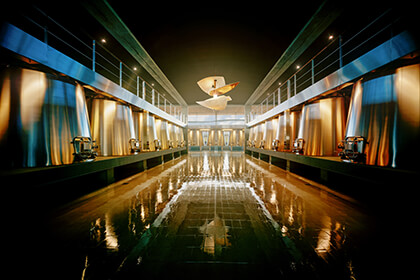
Following a traditional vinification, Chateau Beychevelle is aged for a period of 18 months in French oak barrels, of which 50% new oak. The estate’s sought-after second wine Amiral de Beychevelle, made from younger vines, is aged for 12 months in French oak, of which 30% is new. Both wines are fined with egg whites and racked by candlelight, as dictated by Medoc tradition. The wines are bottled in the spring.
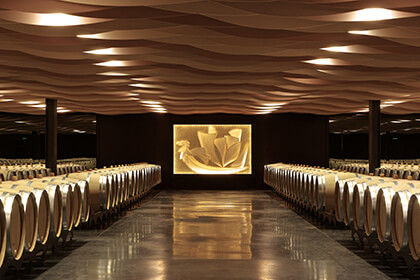
Chateau Beychevelle also produces a wine named Les Brulieres de Beychevelle from 12 hectares of vines in the Haut-Medoc appellation. This wine blends just Cabernet Sauvignon and Merlot, and is vinified in a separate winery but with the same care and attention as the estate’s First and Second Wines.
Chateau Beychevelle | Wines with a Classic Saint-Julien Style
In many ways the magnificent Chateau Beychevelle estate, with its stunning architecture and glorious gardens, stands as an accurate representation of the property’s wines. The words “purity,” “elegance,” “concentration” and “richesse” come to mind when describing these wines. While the specific style of the estate’s first wine depends largely on the character of each vintage, Chateau Beychevelle is best known for its smooth, rich texture on the palate and its understated power.
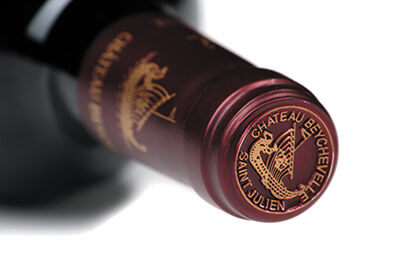
The 2019 vintage, for example, is revealing fresh fruit and a tannic structure with gorgeous elegance and depth. The excellent 2015 vintage offers on the nose a core of rich dark cherry, cassis and plum preserves, elevated by nuanced aromas of smoked meat, garrigue, leather and earth. These wines will pair beautifully with classic meat dishes, like stewed oxtail or bavette steak with roasted potatoes. More delicate vintages will also pair beautifully with heartier seafood dishes, like grilled tuna or swordfish.
